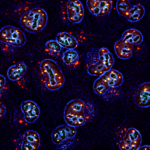Lien vers Pubmed [PMID] – 32049050
Lien DOI – 10.1016/j.immuni.2020.01.006
Immunity 2020 02; 52(2): 328-341.e5
Fever, an evolutionarily conserved physiological response to infection, is also commonly associated with many autoimmune diseases, but its role in T cell differentiation and autoimmunity remains largely unclear. T helper 17 (Th17) cells are critical in host defense and autoinflammatory diseases, with distinct phenotypes and pathogenicity. Here, we show that febrile temperature selectively regulated Th17 cell differentiation in vitro in enhancing interleukin-17 (IL-17), IL-17F, and IL-22 expression. Th17 cells generated under febrile temperature (38.5°C-39.5°C), compared with those under 37°C, showed enhanced pathogenic gene expression with increased pro-inflammatory activities in vivo. Mechanistically, febrile temperature promoted SUMOylation of SMAD4 transcription factor to facilitate its nuclear localization; SMAD4 deficiency selectively abrogated the effects of febrile temperature on Th17 cell differentiation both in vitro and ameliorated an autoimmune disease model. Our results thus demonstrate a critical role of fever in shaping adaptive immune responses with implications in autoimmune diseases.

